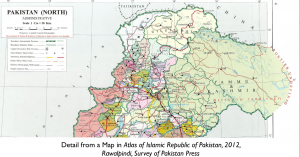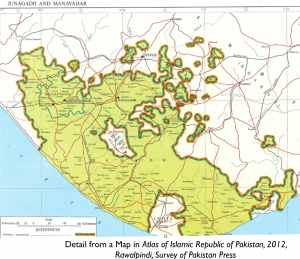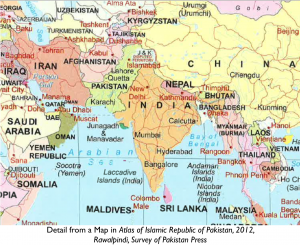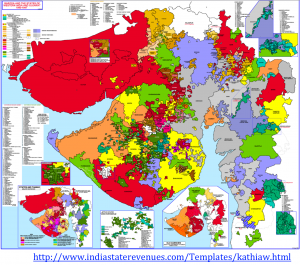Asian.Century
ELITE MEMBER

- Joined
- Nov 1, 2010
- Messages
- 10,753
- Reaction score
- -2
- Country
- Location
Does Pakistan Claim Junagadh in the Indian State of Gujarat?
India and Pakistan’s territorial conflict over Kashmir (“Jammu and Kashmir” officially) is well known, as are the complications that it creates for cartographers. Maps produced in India must portray all of the disputed area as Indian land, while Pakistani maps show it as part of Pakistan. Outside observers who try to remain impartial usually divide these two countries at the actual line of control, depicting the areas under Indian administration as part of India and those under Pakistani administration as part of Pakistan. Careful maps note that the boundary line is disputed. If one does not indicate the conflicted nature of the division, controversy can ensue. As we have discovered at GeoCurrents, maps that do not include Pakistani-controlled Gilgit-Baltistan and Azad Kashmir as parts of India can arouse the ire of Indian readers.
 The new edition (2012) of the Atlas of Islamic Republic of Pakistan is an interesting source to examine the Pakistani position on this issue. The atlas has official status; its copyright is marked as “Government of Pakistan,” it was printed by the Survey of Pakistan, and it was published under the direction of Surveyor-General of Pakistan. Not surprisingly, its maps portray Kashmir as part of Pakistan, but they do mark most of this area as “Disputed Territory,” further specifying that its eastern border with China remains “undefined.” The Atlas does, however, oddly exclude Gilgit from the disputed zone. It also never marks the actual line of control that separates Indian-administered from Pakistani-administered territory.
The new edition (2012) of the Atlas of Islamic Republic of Pakistan is an interesting source to examine the Pakistani position on this issue. The atlas has official status; its copyright is marked as “Government of Pakistan,” it was printed by the Survey of Pakistan, and it was published under the direction of Surveyor-General of Pakistan. Not surprisingly, its maps portray Kashmir as part of Pakistan, but they do mark most of this area as “Disputed Territory,” further specifying that its eastern border with China remains “undefined.” The Atlas does, however, oddly exclude Gilgit from the disputed zone. It also never marks the actual line of control that separates Indian-administered from Pakistani-administered territory.
 The truly peculiar feature of the atlas, however, is not its portrayal of Kashmir, but rather that of the Indian state of Gujarat. All maps of Pakistan in the atlas depict a sizable section of western Gujarat as an integral, non-disputed part of Pakistan, whereas its world political map seemingly classifies this same region as if it were an independent country. The area in question is the former princely state of Junagadh. In the imagination of the cartographer, “Junagadh and Manavadar” retains its former complex territory, with numerous exclaves and enclaves, that in actuality vanished shortly after the end of British India. Such fractionated territoriality reflects its heritage as an autonomous statelet that had been under the suzerainty of the British Raj during colonial time. After partition, Junagadh became part of the Republic of India, but evidently that incorporation is still viewed as illegitimate in some
The truly peculiar feature of the atlas, however, is not its portrayal of Kashmir, but rather that of the Indian state of Gujarat. All maps of Pakistan in the atlas depict a sizable section of western Gujarat as an integral, non-disputed part of Pakistan, whereas its world political map seemingly classifies this same region as if it were an independent country. The area in question is the former princely state of Junagadh. In the imagination of the cartographer, “Junagadh and Manavadar” retains its former complex territory, with numerous exclaves and enclaves, that in actuality vanished shortly after the end of British India. Such fractionated territoriality reflects its heritage as an autonomous statelet that had been under the suzerainty of the British Raj during colonial time. After partition, Junagadh became part of the Republic of India, but evidently that incorporation is still viewed as illegitimate in some Pakistani governmental circles. The map in question also portrays the city of Diu as remaining under Portuguese control, whereas in actuality it was annexed by India in 1961.
Pakistani governmental circles. The map in question also portrays the city of Diu as remaining under Portuguese control, whereas in actuality it was annexed by India in 1961.
The Junagadh controversy goes back to 1947-1948 and the emergence of India and Pakistan as independent states. At the time, the rulers of the “princely states” were given some leeway in regard to which country their territories would join. Problems emerged in several princely states, especially those in which the ruler followed a different religion from that followed by the minority of his subjects. Whereas Kashmir at the time was ruled by a Hindu but had a clear Muslim majority, the situation in Junagadh was reversed. During the partition process, the Nawab of Junagadh tied to join his state to Pakistan, much to the displeasure of both his subjects and the British viceroy, Lord Mountbatten. India was also infuriated, and responded with a blockade of the territory. As explained in the Wikipedia:
Eventually, [India’s Deputy Prime Minister Vallabhbhai] Patel ordered the forcible annexation of Junagadh’s three principalities. Junagadh’s state government, facing financial collapse and lacking forces with which to resist Indian force, invited the Government of India to take control. A plebiscite was conducted in December, in which approximately 99% of the people chose India over Pakistan.
…..
Nehru [subsequently] sent a telegram to Liaquat Ali Khan about the Indian take-over of Junagadh. Khan sent a return telegram to Nehru stating that Junagadh was Pakistani territory, and nobody except the Pakistan government was authorised to invite anybody to Junagadh. He also accused the Indian Government of naked aggression on Pakistan’s territory and of violating international law. The Government of Pakistan strongly opposed the Indian occupation.
As evidenced by the Atlas of Islamic Republic of Pakistan, the government of Pakistan has never accepted India’s annexation of the territory, which did proceed in a highly irregular manner. (In fact, as reported to me by by Munis Faruqui, “the Pakistan government still issues a very limited number of car license plates emblazoned with the name “Junagadh,(presumably to members of the former royal family.”) But its also seems clear that a sizable majority of Junagadh’s people wanted union with India, although the 99-percent pro-India vote does make me rather suspicious of the plebiscite.
 Another complicating factor was the extraordinarily complex and essentially feudal nature of the political geography of India’s princely states, especially those in Gujarat (see http://www.indiastaterevenues.com/Templates/kathiaw.html for a superb map, reproduced here at a reduced scale). Manavadar, for example, formed a separate territory under the vassalage Junagadh, which in turn was something of a vassal of the much more populous state of Baroda, which had been ruled by a Hindu Maharaja. According to some sources, such subordination meant that their rulers had no right to choose between India and Pakistan. As outlined in a different Wikipedia article:
Another complicating factor was the extraordinarily complex and essentially feudal nature of the political geography of India’s princely states, especially those in Gujarat (see http://www.indiastaterevenues.com/Templates/kathiaw.html for a superb map, reproduced here at a reduced scale). Manavadar, for example, formed a separate territory under the vassalage Junagadh, which in turn was something of a vassal of the much more populous state of Baroda, which had been ruled by a Hindu Maharaja. According to some sources, such subordination meant that their rulers had no right to choose between India and Pakistan. As outlined in a different Wikipedia article:
On 14 September 1947, following the independence of the new Dominions of India and Pakistan, the Khan Sahib Ghulam Moinuddin Khanji acceded the state of Manavadar to the Dominion of Pakistan though the state had no such right to do so being a vassal of Junagarh. This act was done at the same time as his master, the Nawab of Junagadh who himself had no right, being a vassal of Baroda State. Indian police forces were subsequently sent into Manavadar on 22 October 1947, and the Khan Sahib was placed under house arrest at Songadh.
In a fascinating and informative article, Sandeep Bhardwaj refers to the accession of Junagadh to India as a “farce of history.” As he notes:
Junagadh itself contained dozens of petty estates and sheikhdoms within it. In fact the situation was so confusing that it took the Government of India several weeks just to figure out the correct borders before they could formulate a military plan. Moreover, the government lawyers couldn’t figure out whether these tiny sheikhdoms were legally independent or under the suzerainty of Junagadh even after the accession. But Junagadh was an important state, with a population of 700,000, 80% of them Hindus and, predictably, ruled by a Muslim prince.
The Nawab of Junagadh was an eccentric character, famously obsessed with dogs. He was said to have owned 800 of them, each with its individual human attendant. When two of his favourite dogs mated, he is said to have spent Rs. 20-30 lakhs in “wedding” celebrations, and proclaimed the day as State holiday. It is no surprise that the actual governing of the Junagadh was carried out by his dewan (Chief Minister). In the last months of British India his dewan was a Muslim League politician named Shah Nawaz Bhutto (father of future Pakistani Prime Minister Zulfikar and grandfather to Benazir Bhutto).
Farce or not, the accession of Junagadh to India apparently remains a highly contentious issue in Pakistan, at least from the evidence found in the Atlas of Islamic Republic of Pakistan. But as we shall see in a later post, this atlas is itself an extremely problematic work at a number of different levels.
(Note: I am indebted to Chris Kremer for bringing this atlas, and its depiction of Junagadh, to my attention)
Source: http://www.geocurrents.info/geopoli...m-junagadh-indian-state-gujarat#ixzz4Hpofn8xJ
India and Pakistan’s territorial conflict over Kashmir (“Jammu and Kashmir” officially) is well known, as are the complications that it creates for cartographers. Maps produced in India must portray all of the disputed area as Indian land, while Pakistani maps show it as part of Pakistan. Outside observers who try to remain impartial usually divide these two countries at the actual line of control, depicting the areas under Indian administration as part of India and those under Pakistani administration as part of Pakistan. Careful maps note that the boundary line is disputed. If one does not indicate the conflicted nature of the division, controversy can ensue. As we have discovered at GeoCurrents, maps that do not include Pakistani-controlled Gilgit-Baltistan and Azad Kashmir as parts of India can arouse the ire of Indian readers.
 The new edition (2012) of the Atlas of Islamic Republic of Pakistan is an interesting source to examine the Pakistani position on this issue. The atlas has official status; its copyright is marked as “Government of Pakistan,” it was printed by the Survey of Pakistan, and it was published under the direction of Surveyor-General of Pakistan. Not surprisingly, its maps portray Kashmir as part of Pakistan, but they do mark most of this area as “Disputed Territory,” further specifying that its eastern border with China remains “undefined.” The Atlas does, however, oddly exclude Gilgit from the disputed zone. It also never marks the actual line of control that separates Indian-administered from Pakistani-administered territory.
The new edition (2012) of the Atlas of Islamic Republic of Pakistan is an interesting source to examine the Pakistani position on this issue. The atlas has official status; its copyright is marked as “Government of Pakistan,” it was printed by the Survey of Pakistan, and it was published under the direction of Surveyor-General of Pakistan. Not surprisingly, its maps portray Kashmir as part of Pakistan, but they do mark most of this area as “Disputed Territory,” further specifying that its eastern border with China remains “undefined.” The Atlas does, however, oddly exclude Gilgit from the disputed zone. It also never marks the actual line of control that separates Indian-administered from Pakistani-administered territory. The truly peculiar feature of the atlas, however, is not its portrayal of Kashmir, but rather that of the Indian state of Gujarat. All maps of Pakistan in the atlas depict a sizable section of western Gujarat as an integral, non-disputed part of Pakistan, whereas its world political map seemingly classifies this same region as if it were an independent country. The area in question is the former princely state of Junagadh. In the imagination of the cartographer, “Junagadh and Manavadar” retains its former complex territory, with numerous exclaves and enclaves, that in actuality vanished shortly after the end of British India. Such fractionated territoriality reflects its heritage as an autonomous statelet that had been under the suzerainty of the British Raj during colonial time. After partition, Junagadh became part of the Republic of India, but evidently that incorporation is still viewed as illegitimate in some
The truly peculiar feature of the atlas, however, is not its portrayal of Kashmir, but rather that of the Indian state of Gujarat. All maps of Pakistan in the atlas depict a sizable section of western Gujarat as an integral, non-disputed part of Pakistan, whereas its world political map seemingly classifies this same region as if it were an independent country. The area in question is the former princely state of Junagadh. In the imagination of the cartographer, “Junagadh and Manavadar” retains its former complex territory, with numerous exclaves and enclaves, that in actuality vanished shortly after the end of British India. Such fractionated territoriality reflects its heritage as an autonomous statelet that had been under the suzerainty of the British Raj during colonial time. After partition, Junagadh became part of the Republic of India, but evidently that incorporation is still viewed as illegitimate in some Pakistani governmental circles. The map in question also portrays the city of Diu as remaining under Portuguese control, whereas in actuality it was annexed by India in 1961.
Pakistani governmental circles. The map in question also portrays the city of Diu as remaining under Portuguese control, whereas in actuality it was annexed by India in 1961.The Junagadh controversy goes back to 1947-1948 and the emergence of India and Pakistan as independent states. At the time, the rulers of the “princely states” were given some leeway in regard to which country their territories would join. Problems emerged in several princely states, especially those in which the ruler followed a different religion from that followed by the minority of his subjects. Whereas Kashmir at the time was ruled by a Hindu but had a clear Muslim majority, the situation in Junagadh was reversed. During the partition process, the Nawab of Junagadh tied to join his state to Pakistan, much to the displeasure of both his subjects and the British viceroy, Lord Mountbatten. India was also infuriated, and responded with a blockade of the territory. As explained in the Wikipedia:
Eventually, [India’s Deputy Prime Minister Vallabhbhai] Patel ordered the forcible annexation of Junagadh’s three principalities. Junagadh’s state government, facing financial collapse and lacking forces with which to resist Indian force, invited the Government of India to take control. A plebiscite was conducted in December, in which approximately 99% of the people chose India over Pakistan.
…..
Nehru [subsequently] sent a telegram to Liaquat Ali Khan about the Indian take-over of Junagadh. Khan sent a return telegram to Nehru stating that Junagadh was Pakistani territory, and nobody except the Pakistan government was authorised to invite anybody to Junagadh. He also accused the Indian Government of naked aggression on Pakistan’s territory and of violating international law. The Government of Pakistan strongly opposed the Indian occupation.
As evidenced by the Atlas of Islamic Republic of Pakistan, the government of Pakistan has never accepted India’s annexation of the territory, which did proceed in a highly irregular manner. (In fact, as reported to me by by Munis Faruqui, “the Pakistan government still issues a very limited number of car license plates emblazoned with the name “Junagadh,(presumably to members of the former royal family.”) But its also seems clear that a sizable majority of Junagadh’s people wanted union with India, although the 99-percent pro-India vote does make me rather suspicious of the plebiscite.
 Another complicating factor was the extraordinarily complex and essentially feudal nature of the political geography of India’s princely states, especially those in Gujarat (see http://www.indiastaterevenues.com/Templates/kathiaw.html for a superb map, reproduced here at a reduced scale). Manavadar, for example, formed a separate territory under the vassalage Junagadh, which in turn was something of a vassal of the much more populous state of Baroda, which had been ruled by a Hindu Maharaja. According to some sources, such subordination meant that their rulers had no right to choose between India and Pakistan. As outlined in a different Wikipedia article:
Another complicating factor was the extraordinarily complex and essentially feudal nature of the political geography of India’s princely states, especially those in Gujarat (see http://www.indiastaterevenues.com/Templates/kathiaw.html for a superb map, reproduced here at a reduced scale). Manavadar, for example, formed a separate territory under the vassalage Junagadh, which in turn was something of a vassal of the much more populous state of Baroda, which had been ruled by a Hindu Maharaja. According to some sources, such subordination meant that their rulers had no right to choose between India and Pakistan. As outlined in a different Wikipedia article:On 14 September 1947, following the independence of the new Dominions of India and Pakistan, the Khan Sahib Ghulam Moinuddin Khanji acceded the state of Manavadar to the Dominion of Pakistan though the state had no such right to do so being a vassal of Junagarh. This act was done at the same time as his master, the Nawab of Junagadh who himself had no right, being a vassal of Baroda State. Indian police forces were subsequently sent into Manavadar on 22 October 1947, and the Khan Sahib was placed under house arrest at Songadh.
In a fascinating and informative article, Sandeep Bhardwaj refers to the accession of Junagadh to India as a “farce of history.” As he notes:
Junagadh itself contained dozens of petty estates and sheikhdoms within it. In fact the situation was so confusing that it took the Government of India several weeks just to figure out the correct borders before they could formulate a military plan. Moreover, the government lawyers couldn’t figure out whether these tiny sheikhdoms were legally independent or under the suzerainty of Junagadh even after the accession. But Junagadh was an important state, with a population of 700,000, 80% of them Hindus and, predictably, ruled by a Muslim prince.
The Nawab of Junagadh was an eccentric character, famously obsessed with dogs. He was said to have owned 800 of them, each with its individual human attendant. When two of his favourite dogs mated, he is said to have spent Rs. 20-30 lakhs in “wedding” celebrations, and proclaimed the day as State holiday. It is no surprise that the actual governing of the Junagadh was carried out by his dewan (Chief Minister). In the last months of British India his dewan was a Muslim League politician named Shah Nawaz Bhutto (father of future Pakistani Prime Minister Zulfikar and grandfather to Benazir Bhutto).
Farce or not, the accession of Junagadh to India apparently remains a highly contentious issue in Pakistan, at least from the evidence found in the Atlas of Islamic Republic of Pakistan. But as we shall see in a later post, this atlas is itself an extremely problematic work at a number of different levels.
(Note: I am indebted to Chris Kremer for bringing this atlas, and its depiction of Junagadh, to my attention)
Source: http://www.geocurrents.info/geopoli...m-junagadh-indian-state-gujarat#ixzz4Hpofn8xJ













 As if India is offering all these to their inhabitants. There are atleast 6 separatist moments in India. Either they all are crazy in their decision to leave India, or ...... so keep calm.
As if India is offering all these to their inhabitants. There are atleast 6 separatist moments in India. Either they all are crazy in their decision to leave India, or ...... so keep calm.


